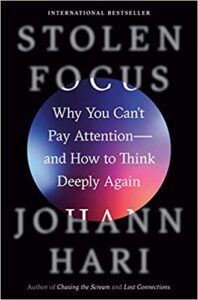Avoiding Interruption to Find Creative Flow: aka How Our Devices are Distracting Us

“A flow state…This is when you are so absorbed in what you are doing that you lose all sense of yourself, and time seems to fall away, and you are flowing into the experience itself. It is the deepest form of focus and attention that we know of…We know at some level, that when we are not focusing, we are not using one of our greatest capacities.” – Johann Hari
As I write this, I am sitting at a local cafe. They are playing rhythmic alternative music, the doors are open and fans are overhead on a sunny day in San Francisco. I am drinking an oat milk latte (decaf) and having a blueberry muffin. I have turned off my phone and my computer can not access the internet here. I’m just writing – the words are flowing. This is my sweet spot, and what I’m often craving. To drop into a creative time where I can listen to myself and what wants to arrive in this liminal space of presence.
I’ve been realizing a very difficult fact about my day to day reality. I have become very distractible and my ability to focus has felt diminished in various ways over the last few years. I still feel mentally sharp and physically healthy, but it is a result of our lives with screens, social media engagement and the disconnection from ‘real life experiences’ that has been inevitable due to the pandemic, I can easily get restless, pre-occupied with getting things ‘done’ and overworking. This also means that my creative life suffers.
I remember when smart phones first came out, and I was one of the last people in my close circle to acquire one. I was convinced I would get hooked in due to my addictive nature. I wanted to continue to go about my life without having a phone tied to me, and to be in the world and not be reachable. I liked coming home to check messages and didn’t wish to be on call 24/7. Well…you know the end of the story, inevitably I broke down and what I feared is now a normal fact of life. Wherever I go, I am accessible and can be in contact with anyone and everyone. However this does not make me feel less alone, or more connected. I also know that this is not my individual problem, it has been encroaching on us as a society through technology.
I have decided to commit to an ongoing inquiry into this age of distraction that is not going away as I know that facing the issue head on is always the first step. I have started to dig deeper into this lack of focus to see how I can not only work on this myself but also help my clients and students. How we can come back to something more essential about our life, our work flow, and our creative activities?
A few simple things you can do to minimize interruptions and find FLOW in art making and/or creative activities (gardening, cooking, journal writing, etc.) are the following:
- Turn off or put away your phone, computer, and any other device that sends you notifications
- Leave the house or office to be in another environment away from daily tasks
- Listen to music that inspires you (but not podcasts or the news which will divide your focus)
- Take small breaks to stretch, walk or dance (unless your art is dance – then pause the movement and switch gears)
- Find productive ways to circumvent the negative voices and the comparisons that we are bombarded with through social media
- Give yourself enough time to make art or engage in your activity so you can get through the resistance that will inevitably arise
- Work with a trusted guide, mentor, therapist to examine the underlying triggers that keep you hooked into to the distractions
I know how easy it is to fall back into checking our devices and get lost down a rabbit hole. I find it is so important to not judge ourselves when distractions come, but to continue to strive towards change in our behaviors, as well as get support if we can’t make any headway with our meaningful practices and projects. There is incredible power and healing we can find when we can relax into the flow.
To learn more about how this phenomenon of diminished focus is happening on a global scale, I encourage you to read Stolen Focus by Johann Hari, here.
Artwork Credit: Spring Berlandt
Resources:
Stolen Focus: Why You Can’t Pay Attention–and How to Think Deeply Again
 In the United States, teenagers can focus on one task for only sixty-five seconds at a time, and office workers average only three minutes. Like so many of us, Johann Hari was finding that constantly switching from device to device and tab to tab was a diminishing and depressing way to live. He tried all sorts of self-help solutions—even abandoning his phone for three months—but nothing seemed to work. So Hari went on an epic journey across the world to interview the leading experts on human attention—and he discovered that everything we think we know about this crisis is wrong.
In the United States, teenagers can focus on one task for only sixty-five seconds at a time, and office workers average only three minutes. Like so many of us, Johann Hari was finding that constantly switching from device to device and tab to tab was a diminishing and depressing way to live. He tried all sorts of self-help solutions—even abandoning his phone for three months—but nothing seemed to work. So Hari went on an epic journey across the world to interview the leading experts on human attention—and he discovered that everything we think we know about this crisis is wrong.
Purchase Stolen Focus: Why You Can’t Pay Attention–and How to Think Deeply Again.